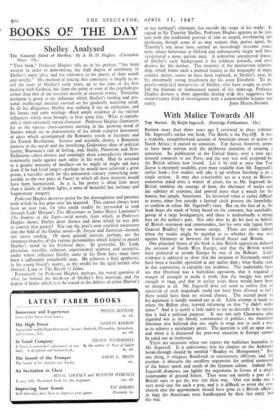BOOKS OF THE DAY
Shelley Analysed
The Nascent Mind of Shelley. By A. M. D. Hughes. (Clarendon Press. 15s.)
"Tfus book," Professor Hughes tells us in his preface, "has been written in order to demonstrate the high degree of continuity in Shelley's main ideas and the relevance to his poetry of their worth and weight." His method of tracing this continuity is largely to re- tell the story of Shelley's early years, up to the time of his first meeting with Godwin, but from the point of view of the psychologist rather than that of the recorder merely of external events. Particular attention is given to the influence which Shelley's reading and per- sonal intellectual contacts exerted on his gradually maturing mind. In all his allegiances Shelley was nothing if not an enthusiast, and his letters and early writings 2fford ample evidence of the various influences which were brought to bear upon him. What is remark- able is their extremely varied character. Professor Hughes illuminates for us the various cross-currents meeting in the growing mind of Shelley which are so characteristic of the whole complex movement of ideas which accompanied the Romantic revolt in literature and the French Revolution. Science and scientific theory, a Romantic interest in the occult and the horrifying, Godwinian ideas of political justice, Rousseau's cult of feeling, and, finally, Platonism and Neo- Hellenism—these diverse and seemingly often contradictory elements continually jostle against each other in his work. Had he attained to a greater maturity of intellect—as he might or might not have done if he had lived longer—perhaps he would have achieved a great poem, a veritable myth for the nineteenth century (something com- parable to the two parts of Faust) in which all these interests would have been harmonised. As it is, his poetry is often little more than a dazzle of broken lights, a mass of beautiful but inchoate and fragmentary imagery.
Professor Hughes deserves praise for the thoroughness and patience with which he has gone over his material. This cannot always have been an easy task, for who could readily be persuaded to read through Lady Morgan's The Missionary or James Henry Lawrence's The Empire of the Nairs—wild novels, from which, as Professor Hughes shows, Shelley drew themes and ideas which he was able to convert into poetry? Nor can the poet's own youthful excursions into the field of the Gothic novel—St. Irvyne and Zastrozzi---furnish any easier reading. Of more general interest, perhaps, are the character-sketches of the various personalities which helped to mould Shelley's mind in his boyhood days. In particular, Dr. Lind, physician, traveller, collector, experimental scientist and eccentric, under whose influence Shelley came in his Eton days, must have been a sufficiently remarkable man. He achieves a final apotheosis in his young friend's poetry, as the model for the aged hermit who liberates Laon in The Revolt c-j Islam.
Fortunately for Professor Hughes, perhaps, the vexed question of what lay behind the break-up of Shelley's first marriage, and the degree of blame which is to be traced to the defects of either Harriet's or her husband's character, lies -outside the scope of his study. It- regard to Sir Timothy Shelley, Professor Hughes appears to be con- tent with the traditional portrait of him as stupid, overbearing and intolerant, though some of us may suspect that, genius apart, Sir Timothy's son must have seemed an exceedingly tiresome young man, whose behaviour at Oxford and subsequently might well have exasperated a more patient man. A somewhat unexpected feature of Shelley's early background is his coldness towards, and even distaste for his mother. The intensity of the mother-sou relation- ship, which forms such a marked feature in the biography of many creative artists, seems to have been replaced, in Shelley's case, by his abnormally strong attachment for his sister Elizabeth. To the psycho-analy:ical interpre:ers of Shelley, who have sought to estab- lish the bisexual or homosexual nature of his make-up, Professor Hughes devotes a short appendix dealing wilk this suggestive but unsatisfactory field of investigation with a commendable balance and


































 Previous page
Previous page